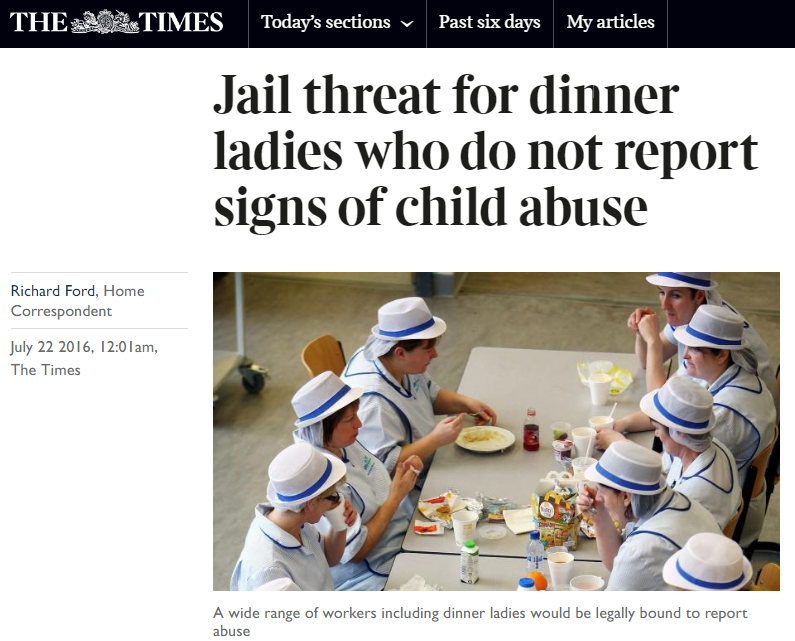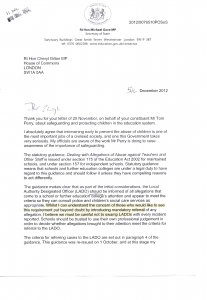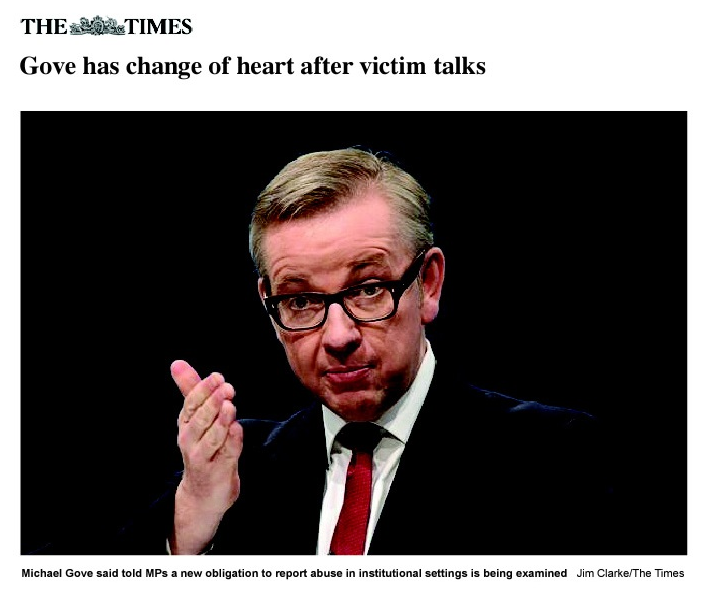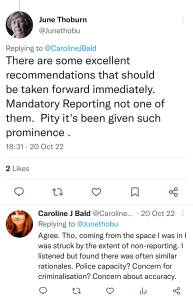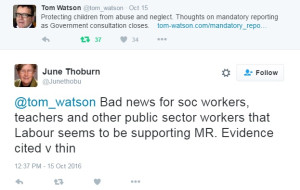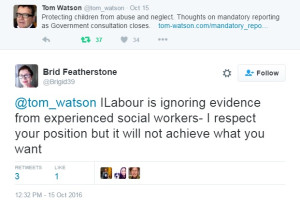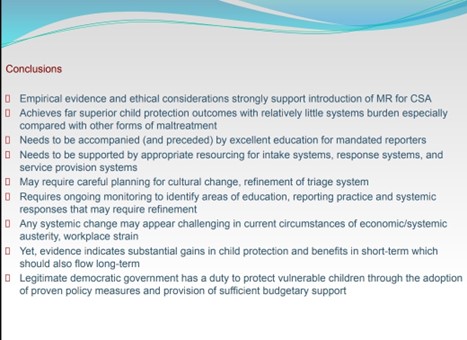Occam’s razor leads us to reach this conclusion. For example, the questionnaire in the 2016 consultation “Reporting and Acting on Child Abuse and Neglect”, together with its accompanying commentary revealed the government’s mindset. Here is how on the last day of parliament, the Home Office media department used the press to strike fear into anyone working in institutions with responsibility for children.
Nick Ferrari, the LBC breakfast presenter, excitedly told his audience “a school secretary could be jailed for not reporting suspected abuse.”
Of course the claims were untrue but it reveals the extent to which government is against mandatory reporting of child abuse of any design, not even of child sexual abuse which is a crime in every jurisdiction in the world.
Here is another piece of evidence. The Home Office Minister responsible for the consultation was Karen Bradley, who is currently Chair of the House of Commons Procedure Committee. The consultation papers were signed off by her on 12th October 2015 but not placed in the House until 9 months later – on the last day of Parliament 21st July 2016. The consultation closed 13 weeks later when Parliament was again in recess for conference season. Odd that.
Here’s a link to the original document released in Parliament, and a link to all related documents for the consultation.
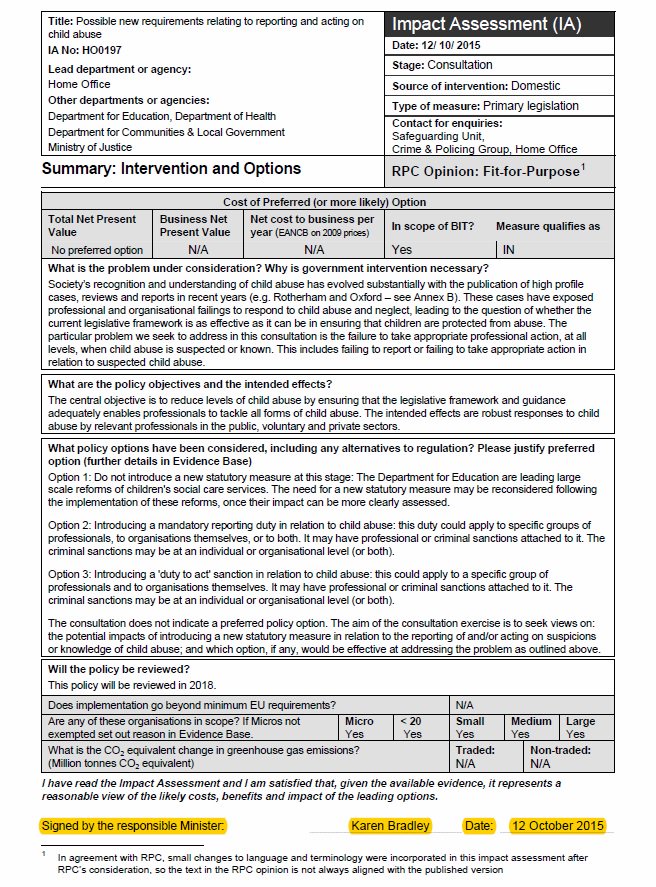
See highlighted date of sign off
The consultation documents lacked any empirical evidence from jurisdictions that have MR. It was an example of ‘gaze aversion’ to facts which causes so many problems in safeguarding. The version of mandatory reporting proposed in the consultation documents was so bad that Mandate Now rejected it in the form described. The entire exercise had the appearance of having been designed to achieve one outcome – no change.
Unsurprisingly “swamp, flood and overwhelm” arguments remain a regular feature of Government-speak.
Here is the former Children’s Minister Tim Loughton (he lasted two years before being sacked on 4 September 2012) speaking in 2014.
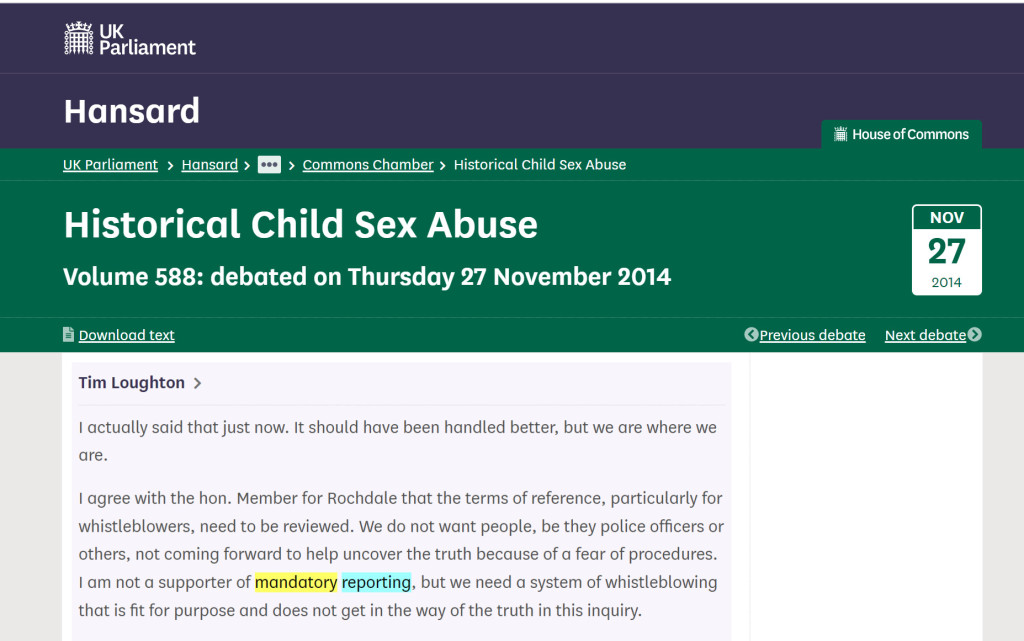
His suggestion about whistleblowing demonstrates just how little he understands about institutional safeguarding.
On 30th Nov 2022, as a member of the Home affairs Committee, he said:

No matter the compelling evidence which demonstrates MR of CSA is essential for institutional settings, he remains resolutely anti MR. “Anything but mandatory reporting” is his thinking.
Here is Michael Gove in 2012, then Secretary of State for Education, linking mandatory reporting with ‘swamping’.
But Mr Gove then changed his mind as reported in this Times article of 25.3.14.
There’s no point in having a mind unless you’re capable of changing it when presented with evidence demonstrating you are mistaken.
Unfortunately, a few months after Mr Gove’s announcement of a review into mandatory reporting, and with tangible progress being made, he was moved to run the election. Thereafter, the default negatives about mandatory reporting returned. The Department for Education returned to safeguarding darkness with all these Secretaries of State:
Nicky Morgan July 2014 – July 2016
Justine Greening July 2016 – Jan 2018
Damian Hinds Jan 2018 – July 2019
Gavin Williamson July 2019 – Sept 2021
Nadhim Zahawi Sept 2021 – July 2022
Michelle Donelan July 2022 – July 2022
James Cleverley July 2022 – Sept 2022
Kit Malthouse Sept 2022 – Oct 2022
Gillian Keegan Oct 2022 – Incumbent
The last 8.5 years have given us 9 Secretaries of State at the Department responsible for safeguarding. This churn is another reason institutional safeguarding remains dysfunctional. It’s the same in the civil service with the latest here today gone tomorrow Director of Safeguarding pitching up for a couple of years and then disappearing to another role.
Here are four important notes when evaluating MR data and considering MR for CSA social policy:
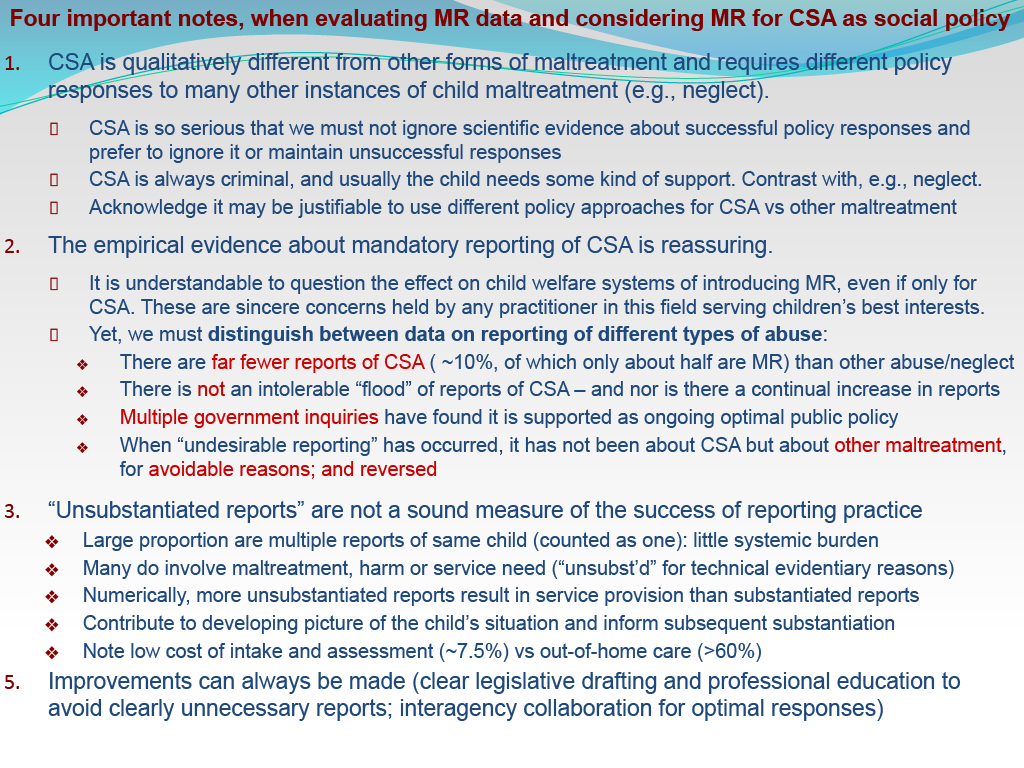 Information such as this has never appeared in any Government consultation documents, nor in the briefing paper on mandatory reporting produced for MPs by the House of Commons Library which we reviewed here : HoC Briefing Paper | ‘Child Protection: duties to report concerns’ | Our critical review of a flawed document. It’s yet another example of an incomplete assessment of MR that unfortunately blindsides lawmakers. It is baffling how such a poor document can be circulated across the Parliamentary estate.
Information such as this has never appeared in any Government consultation documents, nor in the briefing paper on mandatory reporting produced for MPs by the House of Commons Library which we reviewed here : HoC Briefing Paper | ‘Child Protection: duties to report concerns’ | Our critical review of a flawed document. It’s yet another example of an incomplete assessment of MR that unfortunately blindsides lawmakers. It is baffling how such a poor document can be circulated across the Parliamentary estate.
As with Government, social workers are against MR. It’s unusual to see social workers and Government in lockstep on any subject. We recently saw an article suggesting UK social workers are handling up to 50 cases per person when 15 is the norm. If this is correct, and we have no reason to doubt it, it must be addressed so that case numbers return to manageable levels. Council budgets, staff availability (burnout) and pay are reportedly the source of many shortcomings. Work overload fails social workers, children and parents. But social workers defending a failing safeguarding system at the expense of children being sexually abused is unacceptable and it must be addressed by the profession with Government.
Opponents of Mandatory Reporting of CSA commonly make the mistakes of:
- Not distinguishing sexual abuse from other kinds of abuse
- Not distinguishing ‘evidence’ about reports generally, from evidence about reports of sexual abuse (e.g., Using trends in report numbers for maltreatment overall to extrapolate arguments about sexual abuse or other individual types or situations)
- Not distinguishing familial vs. non-familial abuse
- Not exploring the available empirical evidence, or doing so in an unsound way
- Not gathering new evidence and critically assessing it with a scientific method
- Using ‘failures’ of reporting (mistakenly stating that unsubstantiated reports are failures – which in many cases they are not) to claim case identification is not effective or important
- Thinking a policy-based reporting obligation is enough for sexual abuse detection (it isn’t)
- Inferring that because mandatory reporting is not a ‘perfect’ system, it has no place at all in any form
- Not proposing methods of case identification for child abuse which are demonstrably superior to mandatory reporting
- Claiming the costs of investigation are so high that child welfare systems are overburdened (in fact, investigation costs are a tiny fraction of all systemic costs in USA and Australia – considerably under 10% – it’s foster care and residential care that are about 50%)
- Not putting children first, instead protecting existing systems/methods which are demonstrably inadequate. Every child identified as a result of a report by a mandated reporter, where that child’s situation would not otherwise have come to light, has had their life changed immeasurably for the better, and those of their families and loved ones and future generations (also saving downstream cost, incidentally). Considering the figures about case identification by mandated reporters should get people thinking about whether it’s a good idea or not
- Comparing mandatory reporting unsupported by any other measure against the full range of other measures they can think of, as if the two were mutually exclusive.
Here is an example of social worker attitude to mandatory reporting:
Again, even within two tweets the ‘capacity’ issue reappears. Perhaps it is without understanding that only mandatory reporting of child sexual abuse is sought by Mandate Now. Professor Thoburn has been against MR for a considerable time.
Here from 2016 coinciding with the consultation:
Brid Featherstone is Professor in Social Work at the University of Huddersfield
Thoburn’s assertion that MR is ‘bad for teachers and other public sector workers’ reveals she has little appreciation of the essential qualities of good design. That said IICSA’s very limited design for MR is deeply flawed and will contribute no discernible safeguarding improvement even if it is accepted by Government. The design we propose, which is live in parliament at the time of writing this article, is simple, has precedent and provides prescribed mandated reporters with significant protection all of which is in contrast to IICSA’s substandard proposal.
It’s disappointing that Professor Thoburn rejects MR of any type, particularly as she has not, to our knowledge, ever stated an alternative way to increase identification of children being sexually abused (see item #9 in the list above). She was at one time on the ‘academic panel’ of the child abuse inquiry before that panel was disbanded.
Here’s another social worker rejecting MR. Scotland : Child abuse victims are still going undetected || Yet Scottish academics still mistakenly reject mandatory reporting. It’s little more than argument of authority, without supporting evidence or any alternative proposal for the identification of child sexual abuse. The social work profession continues to metaphorically bang its shoe on the desk whilst shouting “no” to MR without any apparent awareness that the data is against them. Importantly, as the article and the table above reveals, nothing is offered by social workers to address the appalling underreporting of child sexual abuse. And how, if not through well-supported mandated reporters, is intra-familial child sexual abuse going to be discovered and stopped? These prescribed personnel are vitally important ‘sentinel reporters’.
What do we mean by well-supported? Here is the support aspect in our proposal which is part of the Private Members Bill currently in Parliament :
3 (2) A person who causes or threatens to cause any detriment to a mandated person, being a person placed under the duty to report pursuant to section 1 above, or to another person, either wholly or partly related to the mandated person’s actual or intended provision of a report under this Act, is guilty of an offence.
3 (3) Detriment includes any personal, social, economic, professional, or other detriment to the person.
3 (4) A person guilty of any offence under this section is liable on summary conviction to a fine not exceeding level 5 on the standard scale.
Here is what happens when well-designed MR of child sexual abuse is introduced:
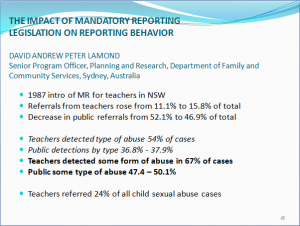
And what of ‘substantiations’ in MR jurisdictions? As mentioned in the ‘opponents list’ above at point #6 ‘substantiations’ / ‘non-substantiations’ should not be used as an indicator of success or failure.
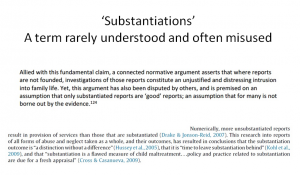 This link takes you to the second presentation by Prof Ben Mathews at MR seminar #2 in April 2019.
This link takes you to the second presentation by Prof Ben Mathews at MR seminar #2 in April 2019.
His conclusion to the significant data presented at IICSA was :
The problems arising from poorly-designed mandatory reporting of child abuse, such as is being justly complained about in the US, seems to be used as an excuse for the government to avoid implementing well-designed mandatory reporting here.
The government appears to have a ‘small state’ ideological dislike of providing effective law to protect children from child sexual abuse.
